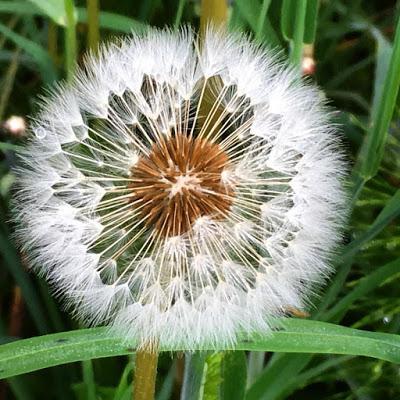
In Full Bloom by Melina Meza
Because I’d been thinking about evolution, natural selection, and human nature for my posts The Power of Negative Emotions and The Power of Desire, it was natural for my mind to turn next to evolution and aging. Actually this is a topic I’ve known something about for quite a long while. Once upon a time, before this blog was even a twinkle in our eyes, Brad and I were considering writing a book on aging (“Reality Check”) and I did quite a bit of research on the topic of aging.Now I wonder, if you had to guess what the relationship between natural selection and aging was, what you would say? For example, what do you think is the reason human women have menopause? Why do our joints wear out with use? Why does our heart muscle weaken with age? Why do our brains develop memory loss and sometimes dementia? If you’re like me and you always want to know the “why” behind the “when” and “how,” then I’m sure you’ve asked those types of questions, especially if you’re noticing signs of aging in yourself or loved ones.
But here’s the thing: Natural selection rewards those who have healthy offspring, who themselves go on to have healthy offspring. So it’s not really survival of the fittest in the sense of your own survival into old age, but instead it’s about the survival of the fittest in the sense of being able to produce fit offspring and raise them through babyhood. So, really, natural selection doesn’t care at all about what happens to you after you produce your children and raise them to be independent (they can walk and feed themselves). That means all the stuff that happens after the age of, let’s say 40, really has no particular purpose, unlike the emotions I talked about in The Power of Negative Emotions and The Power of Desire. So that would mean the answer to why the symptoms of aging exist is that there is no reason. It’s just the way things turned out. I mean our knee joints evolved to be good enough for us to keep us functioning well during our childbearing years, and if they wear out after that (no, they are not perfect in their structure), natural selection doesn’t care.
Menopause is a particularly interesting example. Did you know that the only species that even have menopause are humans and a few species of whales? It’s not a matter of having a long life span. Asian elephants have a typical lifespan of about 86 years, and they not only do not experience menopause but they continue bearing children into old age.
There actually is some disagreement about why human females have menopause. The first argument is that it’s a fluke. Yes, I know that seems harsh and all our thinking about this so-called “natural experience” can be challenged by this idea that there really is no purpose behind this rather unpleasant phase in life. The other argument is called the “good grandmother theory.” This posits that if you stop having children yourself and direct your attention instead to helping raise your grandchildren, your grandchildren will have a better chance of surviving, which means that your genes will be propagated more effectively into the gene pool.
There actually is a theory about why we even survive around into middle and old age (i.e., have a long life span) that’s related to the good grandmother theory about menopause. The theory is that children and grandchildren with older parents/grandparents, who have a lot more knowledge about world and have lived through many different challenging situations (the great flood of 40 years ago or the illness that can be helped by an herb growing in a certain spot) would have thrived better than those who didn’t have wise older relatives in their lives to guide them. Brad is skeptical of this theory, but at least it's a lovely thought.
But the bottom line about aging and evolution is that changes in our physical and brain health as well as our appearance—the same things that happen to all mammals—have no real purpose. And if there is any purpose at all to us being around after we bring our children into the world, it’s for sharing our wisdom and helping to raise the children of our children (or, if you don’t have children, the youngest generation in general).
This tells me that simply cultivating gratitude about being able to enjoy a lifespan that extends beyond my thirties is the way to go. Sometimes when I wake up in the morning with a stiff, achy back and joints that don’t move as fluidly as they used to, I say to myself “I’m lucky to live to be this old.”
For information on cultivating gratitude, see The Biochemical Basis for a Gratitude Practice and Enough.
Subscribe to Yoga for Healthy Aging by Email ° Follow Yoga for Healthy Aging on Facebook ° Follow Baxter Bell Yoga on Instagram ° Join this site with Google Friend Connect

